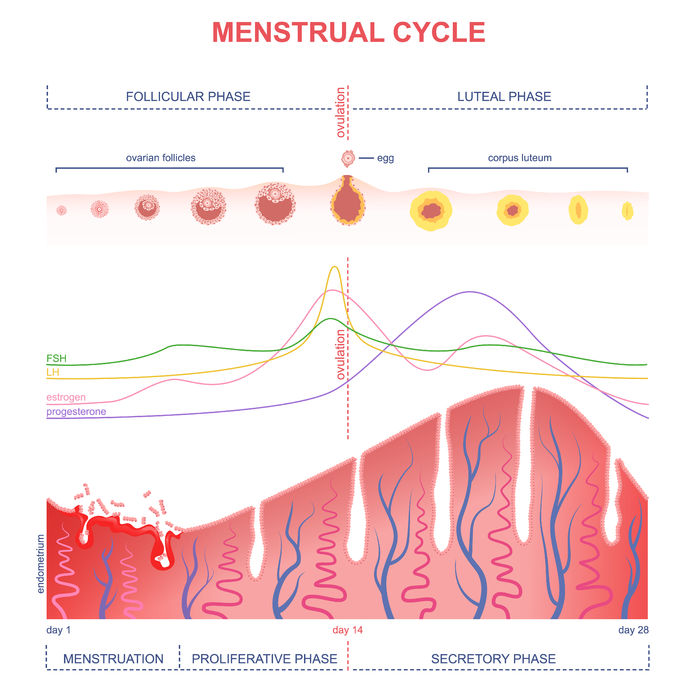|
It’s something many women have resigned themselves to tolerate and live with, or at least until periods do us part. The heavy periods, the “flooding”, the fatigue associated with it, and sometimes the monthly requirement for sick days. Many women don’t know what’s normal and are not given any many options to deal with them other than anti-inflammatories, the birth control pill, endometrial ablasion, or a hysterectomy. However, naturopathic medicine opens up a myriad of treatment options, which need to be targeted to you and the reason why you are getting heavy periods in the first place. I am a big fan of testing in the right context, since it allows us to then create a more targeted and more effective treatment plan for you. Women can start getting heavy periods at different points in their reproductive lives, but what I will be covering today is the tendency towards heavier cycles which tends to occur as women start the transition towards menopause. If you’re nowhere near your 50’s, this could still apply to you: perimenopause can start up to 15 years before your periods actually stop! So, many women in their late 30’s start to experience symptoms. Menstruation 101 Most women have only a very basic understanding of what goes on in their bodies during every menstrual cycle. So that you can breeze through the rest of this blog, let’s give you a rundown of the basics first, shall we? (Psst… Skip over this section if you’re all in the know!) To begin, by convention, the first day of your menstrual cycle is the first day of your menstrual flow. If you have a day or two of spotting before your full flow starts, those spotting days are part of the previous cycle.
The two main key players produced in your ovaries are estrogen and progesterone. Estrogen is the predominant hormone in the first half of your cycle until you ovulate, and then progesterone rises and becomes the predominant hormone (along with a second rise in estrogen). Your uterine lining, which prepares for the possibility of a pregnancy every month, goes from being very thin right after menstruation, to thickening up, maintaining after ovulation, and then shedding at menstruation. If you think of the lining of your uterus as a lawn, think of estrogen as the fertilizer which helps your uterine lining grow, and progesterone as the lawnmower which keeps the growth in check. Estrogen = fertilizer Progesterone = lawnmower What happens in perimenopause? The problem is that in perimenopause, progesterone levels start to dip, usually before estrogen starts to dip significantly. This progesterone dip has to do with irregular ovulation or the poor quality of the eggs that are released. Chronic stress can also decrease your progesterone production. Fertilizer + no or little lawnmower = out of control lawn = heavy periods What is an unusually heavy period? Before we delve into testing, let’s clear up one thing: what defines heavy periods, or “menorrhagia”? -Losing more than 80mL of blood during your period -Soaking a pad or tampon every 2hrs or less And/or -Your period lasts more than 7 days Test, don’t guess If you find yourself in this situation, here are some of the top 3 tests that I would likely order to shed light into what is causing or contributing to your heavy periods.
There are other causes of heavy periods, like clotting disorders, fibroids, polyps, or uterine cancer which can be more fully evaluated through a medical doctor due to their access to testing or imaging. If any of these are suspected, then I would refer you to your medical doctor. Once we know what is going on, we can use our naturopathic tools to help lighten your period and make this transition in your life as manageable as possible! Herbs, nutritional supplements, dietary changes, bio-identical progesterone, and acupuncture can all be helpful to manage heavy perimenopausal periods. If you’re currently navigating this perimenopausal period of your life and are looking for natural solutions, give us a call and I will be delighted to help you. References: Image from 123rf.com Livdans-Forret AB, Harvey PJ, Larkin-Thier SM. Menorrhagia: a synopsis of management focusing on herbal and nutritional supplements, and chiropractic. J Can Chiropr Assoc. 2007 Dec;51(4):235-46.
0 Comments
|
AuthorDr. Tamar Ferreira is a Naturopathic Doctor in Brampton, Ontario. Her areas of focus include digestive health, hormone balance, and skin conditions. Topics
All
Archives
May 2020
|
118 Queen St. W., Suite 205
Brampton, ON
L6X 1A5
905-451-3963




 RSS Feed
RSS Feed